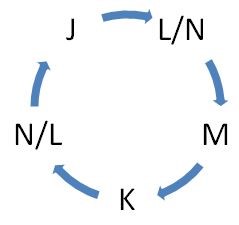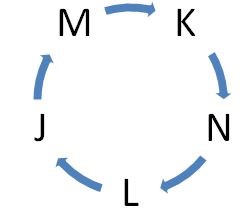Question
J, K, L, M and N are sitting around a circular table
facing the centre. Who are the immediate neighbours of J? I. J is third to the right of K, who is on the immediate left of M. II. N can’t sit adjacent to J. M sits second to the left of L, who is on the immediate left of N. Each of the questions given below has one question and two statements marked I and II. You have to decide whether the data provided in the statements are sufficient to answer the question. Read both the statements and give answer.Solution
From I  Hence I is sufficient to answer the question L and N are J’s neighbours. From II,
Hence I is sufficient to answer the question L and N are J’s neighbours. From II,  L and M are immediate neighbours of J. Hence II is also sufficient to answer the question.
L and M are immediate neighbours of J. Hence II is also sufficient to answer the question.
नीचे दिया गया वाक्य चार भागों में बाँटा गया है ( A), (B), (C), और ( D) �...
निम्नलिखित में से कौन-सा वाक्य शुद्ध है ?
नीचे दिया गया प्रत्येक वाक्य चार भागों में बांटा गया है ज�...
नीचे दिया गया वाक्य चार भागों में बाँटा गया है ( A), (B), (C), और ( D) �...
निम्नलिखित में से कौन-सा वाक्य शुद्ध है ?
निम्नलिखित प्रत्येक प्रश्न में दिये गये चार - चार विकल्पो...
निम्नलिखित प्रश्न में , चार विकल्पों में से , उस विकल्प का च...
नीचे दिया गया वाक्य चार भागों में बाँटा गया है ( A), (B), (C), और ( D) �...
नीचे दिया गया वाक्य चार भागों में बाँटा गया है ( A), (B), (C), और ( D) �...
निम्नलिखित प्रत्येक प्रश्न में दिये गये चार - चार विकल्पो...
Relevant for Exams:



